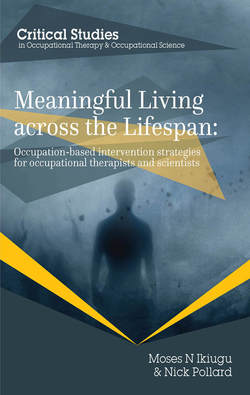Читать книгу Meaningful Living Across the Lifespan - Moses N. Ikiugu - Страница 21
На сайте Литреса книга снята с продажи.
Creating meaning and happiness by not actually pursuing either
ОглавлениеThroughout history, the nature of human action was often determined by social and cultural factors that ensured that achievements were recognized by an individual’s peers and often more significantly, met the demands of the gods. Frankl (2000) argued that these motivations for action were always present even if they were not always recognized. The way to address the urge to achieve was to desist from merely striving to win for the sake of winning, for happiness, or for other gains. Striving to achieve happiness often led to loss of happiness. Such efforts resulted in aggression and were often unsuccessful. A better attitude in life, he suggested, was to adopt a philosophy of doing one’s best while paradoxically maintaining self-detachment. Success and happiness would naturally follow (Frankl, 1978). He described a ‘will to meaning’ (p. 15) as a determination to achieve an end despite everything that may stand in the way of one’s objective. He frequently referred to the idea of heroism which he argued pertained to finding meaning even in suffering (Frankl, 1978, 1969), making it possible to rise above pessimism and fatalism in the face of the inevitability of failure or death. If individuals could recognize that their past achievements could not be taken away from them, they could gain a sense of value, purpose, and meaning, and realize the potential for change, despite death or loss.
In occupational therapy, do Rozario (1994, p. 46) agreed with Frankl’s position by asserting that the profound ‘human longing for ritual and meaning’ was expressed through spiritual pursuits. It is important to point out though that forms of spirituality may have actually originated from practical concerns about the necessity to organize society and to structure communal tasks in order to ensure human survival in particular environments (Mair, 1962; Pryor, 2004). Spirituality thus became important in imbuing humanity with a sense of meaning, yet also served to both uphold and sometimes challenge the status quo throughout the development of human societies. However, though people subscribed to religious beliefs, they tended not to be involved with the deeper discussion of the significance of such beliefs. Such discussion occurred amongst intellectuals concerned with sacred discourses (Berger, 1973).
Frankl’s writings link the quest for human meaning with spirituality and imply that the spiritual crisis of meaning is rather a modern phenomenon. These views appear consistent with a wider recognition of the effects of loss of spirituality and the ritual that comes with it. For example Marr (2009, p. xi) and Dorling (2011, p. 24) suggest that a feature of modern society is that people have abandoned a purposeful [spiritual] ideology and are ‘shopping’ for new guides to a deeper significance to their lives, be it popular astrology, feng shui, angels, crystal therapy or Mayan prophecy (Redfield, 1994). Many of the traditional religions have also at times been rejuvenated to become part of the spiritual bazaar of our times (Berger, 1973).
